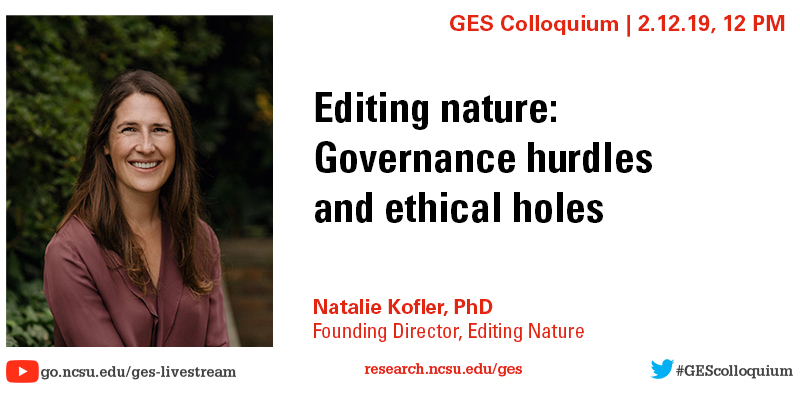
- This event has passed.
GES Colloquium | Natalie Kofler – Editing Nature: Governance hurdles and ethical holes

GES Colloquium | YouTube: LIVE STREAM
Editing Nature: Governance hurdles and ethical holes
Speaker:
Dr. Natalie Kofler, Editing Nature (link, @nataliekofler)
Abstract:
Decisions to genetically engineer wild species – whether for public health, environmental conservation or agriculture – are loaded with genetic, ecological, and societal complexity and uncertainty. With the potential to forever change the evolutionary trajectory of shared environments, novel genetic technologies, such as CRISPR gene editing and synthetic gene drives entail considerable ethical and regulatory challenges. Dr. Natalie Kofler, lead author of a recent article in Science entitled “Editing nature: Local roots of global governance” will describe her vision (and that of her 15 interdisciplinary co-authors) for a coordinated global governance model that integrates local community decision-making authority with global oversight to steer safe and just deployment of environmental genetic technologies. Natalie will outline how scientific and value-based knowledge can inform technology decision-making in ways that are both context-dependent and global in scope. The inadequacy of dominant theories in environmental ethics to support such decisions-making will also be presented and an alternative ethos proposed; one that respect the interconnectedness of human and environmental health and invites technology into that relationship to augment the flourishing of both.
Related publication – Editing Nature: Local roots of global governance (Science)
Bio:
Natalie Kofler is a trained molecular biologist and the founding director of Editing Nature, a global initiative to steer responsible development and deployment of environmental genetic technologies. Natalie’s work navigates the technical, ecological, and ethical complexity of gene editing applications designed to impact wild species, such as CRISPR-edited mosquitos to prevent malaria transmission, genetic strategies to eliminate invasive species, or the use of CRISPR gene editing to promote species resiliency to changing climates. She builds deliberative platforms that engage diverse expertise, worldviews, and historically marginalized voices to foster inclusive technology decision-making, promote wise innovation, and inform sensible policy. She has authored numerous publications on the topic, served on expert panels, and contributes to UN-mandated documents. Her work has been highlighted by Science, Nature, Oregon Public Radio, CBC radio, Pacific Standard Magazine, and National Geographic.
Natalie is a visiting scholar at the Hastings Center and teaches environmental ethics at the Center for Bioethics at Harvard Medical School and the Yale Interdisciplinary Center for Bioethics. Before founding Editing Nature as an Associate Research Scientist at the Yale School of Forestry & Environmental Studies, Natalie completed postdoctoral training at Yale Medical School, received her PhD in cellular, molecular, and medical biosciences from Columbia University, an MS in human nutrition and metabolic studies from Columbia University, and her BS in human anatomy and cell biology from McGill University in Canada.
WordPress database error: [Unknown column 'wp_tec_occurrences.start_date' in 'SELECT']SELECT SQL_CALC_FOUND_ROWS wp_posts.*, CAST( wp_tec_occurrences.start_date AS DATETIME ) AS event_date
FROM wp_posts LEFT JOIN wp_term_relationships ON (wp_posts.ID = wp_term_relationships.object_id) LEFT JOIN wp_postmeta ON ( wp_posts.ID = wp_postmeta.post_id AND wp_postmeta.meta_key = '_EventHideFromUpcoming' ) LEFT JOIN wp_postmeta AS mt1 ON ( wp_posts.ID = mt1.post_id )
WHERE 1=1 AND wp_posts.ID NOT IN (12323) AND (
wp_term_relationships.term_taxonomy_id IN (149,566,595)
OR
wp_term_relationships.term_taxonomy_id IN (45)
) AND (
wp_postmeta.post_id IS NULL
AND
( mt1.meta_key = '_EventStartDate' AND CAST(mt1.meta_value AS DATETIME) >= '2026-02-14 11:20:34' )
) AND wp_posts.post_type IN ('post', 'page', 'attachment', 'tribe_venue', 'tribe_events', 'tribe_event_series') AND ((wp_posts.post_status = 'publish'))
GROUP BY wp_tec_occurrences.occurrence_id
ORDER BY event_date ASC, wp_posts.post_date ASC
LIMIT 0, 3